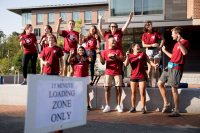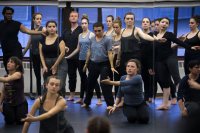
Matriculation Dinner Remarks – Martin Andrucki
AMORE AC STUDIO
Or
The Stockdale Question
It’s customary to start a speech like this with a joke. Instead, I’d like to start with something that’s often much funnier. Etymology. Funny, needless to say, in a “strange” rather than a “ha, ha” sort of way.
You’re all here tonight to “matriculate.” Exactly what does that mean? “Matriculate,” it turns out, is directly related to “matrix,” a word meaning, primarily, “a situation or surrounding . . . within which something originates, develops, or is contained.”
It also means womb—and I’d like to dispose of that one immediately. Whatever else tonight might signify, it emphatically does not mean that you’re crawling into some kind of protective womb for the next four years.
Far from it. You are entering a matrix where things originate and develop; a place where plans, personalities, and futures hatch and grow.
The word “matriculation” refers specifically to the act of enrolling in such a place; joining-up; putting your name on its list of members.
But how does one really join this community? How do you “matriculate” at Bates? And once you’re here, once your name is on the list, what’s the point?
A good question, and one that reminds me of another good question I vividly recall from the 1992 presidential campaign. Let me tell you about it.
What I’m remembering in particular is the vice-presidential debate of 1992. Surely you are all too young to recall this, but Ross Perot had chosen as his running mate that year a man named James Stockdale.
Stockdale was a sterling fellow, having risen to the rank of admiral in the U.S. Navy, and having, like John McCain, spent many years as a prisoner of war in North Vietnam. He had also taken up the study of Ancient Philosophy, in particular the stoics, those thinkers who tried to teach us how to endure life with equanimity.
However, Adm. Stockdale had had absolutely no political experience, and no record of interest in electoral politics.
Probably in his remarks that night he wanted to emphasize that absence of conventional political ambition, to declare that he was really out of his element in an atmosphere of partisan posturing and deception..
And so, he opened his statement with a question: “What am I doing here?” he asked. “What am I doing here?”
At that moment, my heart went out to him. Rather than sounding stoical and above the fray, he sounded sort of—confused. He had put his foot in his mouth by saying what he was actually feeling. Finally, I thought, an honest remark.
Is there anybody anywhere who hasn’t felt exactly like Admiral Stockdale at some crucial moment of life? Who hasn’t asked himself that same question: “What am I doing here?”
And I suspect that many of you, on this evening before the first day of the next four years, are also asking yourselves that question. “What am I doing here?”
Why am I matriculating, putting my name on that list, jumping into that matrix of challenges and possibilities?
As a parent myself, I have a pretty good idea of what your parents think you should be doing here. It probably goes something like this: you should be laying the foundation for an interesting, fulfilling, successful, and independent life.
No doubt, your own goals would be approximately the same, give or take an emphasis or two.
But the question you’re asking yourself is: How? How do I achieve this life of interest and fulfillment and success?
Is there some magic course of study, some blessed major that will open the doors? Some secret combination of courses that will help me hit the jackpot and lure the bluebird of happiness to land on my shoulder?
What am I doing here? What should I be doing here?
I’d like to try to address these questions by telling some stories—stories about people I know—people who were once just like you: students at excellent colleges, standing on the threshold of life, wondering what was in store for them. And here’s the interesting part: stories about people whose lives turned out in unexpected ways.
Let me start with the story of a young woman who left New York City to study biology at a distinguished university in upstate New York. She had been in love with biology all through high school, and was determined to pursue it through college.
And when I say she loved her subject, I am reminded of Bates’ Latin motto: Amore ac Studio, which means something like “With Love and Zeal,” a description of how one comes to be educated. With love and zeal.
Well, that love of biology would require enough zeal to lead her through some odd byways. Soil science, for example—more straightforwardly known as the study of dirt.
But despite the byways, she persisted; and not only persisted, but excelled. Following a successful undergraduate career, she entered graduate school at the same distinguished university, and after completing her degree, became a teacher of biology.
Then one day she looked into the mirror and said to herself, “I want to be a lawyer.” And that was that. ‘Bye, ‘bye, biology.
Law school followed, then admission to the bar, then a distinguished career. Today she is one of the most admired practitioners of her field of law in the state in which she lives. That field is family law—which is to say, mostly divorce.
And so the question arises—if you’ll forgive a cheap alliteration—how did this young woman move from studying dirt to divorce? (Some of you in the audience may not find that such a stretch.) How did her undergraduate studies in biology lead her ultimately to the anatomy of the law?
My next story is about another young woman, this time a graduate of Bates College. Her great love—there’s that word again—was twofold, divided between art and dance.
This love she expressed by majoring in Art history and performing with the Bates Modern Dance Company. Ultimately, she joined the two together in her senior thesis, a dance performance that created a living interpretation on the stage of Schaeffer Theatre of a masterpiece of modern painting.
Did this young woman then join a dance company? No. Did she become a staff member at a museum? No. Did she go to graduate school to study art or dance? Again, no and no.
Instead she went into the world of business and made whopping sums of money as a successful entrepreneur—in large measure through the marketing of a successful brand of cookies.
Now, instead of performing in theaters, she is endowing them.
And again, the question arises: how did this happen? How did a talented young woman find her way along a road that led from modern art and modern dance to cookie dough and dough from cookies?
My third story is about a young man who left home in Indianapolis to study at a prestigious college in New York City, a place where he could indulge his love—familiar word—of English literature. Drama in particular, and especially Elizabethan drama.
Like my other two examples, he excelled in his studies and had a brilliant undergraduate career. Like my biologist, he too moved on to graduate school.
In fact, he was in the midst of writing a thesis on Ben Jonson, Shakespeare’s brilliant younger contemporary, when the military draft intervened.
Suddenly he found himself at the Army language school in Monterey, studying—of all things—Japanese. And much to his astonishment, he found himself becoming enthralled by a language and culture previously unknown to him.
Immersion in Japanese led to a more general interest in the Far East, and in particular in Korea, whose language and culture he also learned.
Joining the foreign service, he spent several years in Japan, then became one of the senior members of the United States diplomatic team assigned to negotiate difficult issues with North Korea.
Now, following three years at the U.N. Security Council, he is the number two man at the American embassy in Seoul, South Korea.
Another case of a life which took a radical turn after college; another reason to ask, how did this happen? How did this Hoosier make the transition from reading Ben Jonson to wrangling with the government of Kim Jong Il?
So, there you have it: three stories—a nice, canonical number. Now let’s ask ourselves what moral we can draw from these three lives that might apply to our central question: What am I doing here?
Well, here are two possibilities.
Moral number one: It just doesn’t matter what you study in college. Life is all twists and turns, and there’s no connection between one part and another.
That conclusion, I’d like to say at once, is quite wrong. It does matter what you study, but not in the ways many might think.
Which brings me to possibility number two:
That it does matter what you study. . . .
BUT . . . . and this is the admonition I always offer advisees . . . . what matters most is that you study what you love. What you are passionate about. What compels you willingly to do the best that you have it in you to do.
Remember the Bates motto: Amore ac Studio. With love and zeal.
When you are zealous for study, you push yourself to succeed. And the experience of success leads you to want more of the same.
Amore ac studio is what should guide your curriculum here: the pursuit of excellence through learning what you love. And, as we have seen, the path of excellence leads to many unanticipated places. But it IS a path.
Thus: Our biologist-lawyer loved ideas about complex systems and Darwinian theories—about nature’s ways of competition and collaboration. And surely that comes in handy in the practice of family law.
Our dancer-capitalist experienced the intoxication of dreaming up a project—her thesis; of working on it heart and soul; and of seeing it happen. She made something that wasn’t there before—the core of creative enterprise.
Our English scholar-diplomat crossed a bridge of his own building, one linking the subtleties literature with diplomatic nuance, and the thrust/counter-thrust of drama with the conflicts and crises of the foreign service.
So without knowing it, they were studying and experiencing what they would eventually need. Or, alternatively, the love and zeal they showed in their college studies was the same force that kept them going through the hairpin turns in their unpredictable lives.
OK. That was the “Mommy” part of my remarks. Now for the “Daddy” part.
Do not misunderstand what I have just been saying. I am not telling you to study only what you feel like studying. I am not giving you permission to go directly to the dessert bar. That’s entirely the wrong interpretation of my advice.
You can’t just do what you want. Why? Well, for one thing, you don’t yet know what you need to know, because you don’t know yet what you have it in you to become.
So discipline yourselves to study what you think you don’t like as well as what you adore. After all, another way of translating Amore ac Studio is, “With Love and Diligence.”
Thus, our biologist thought of herself as a scientist, and perhaps didn’t look hard enough at history and literature.
Our dancer thought of herself as an “arts person,” and steered clear of subjects like economics. Probably she shouldn’t have.
Our Asian diplomat was convinced he was lousy at foreign languages, and avoided them like tight shoes. I wonder if he curses himself in Korean now for his youthful misjudgments?
So in addition to studying and doing what you know you now love, take a shot at what, one day, you might come to love.
If you’re self-consciously a science person, study art.
If you’re an art person, give science your serious attention.
If you’re a political liberal, consider conservative ideas with sympathy.
If you’re a conservative, imagine the world as a liberal sees it.
If you’re an atheist, try to enter into the mind of a person of faith.
And if you’re a believer, consider the skeptic’s point of view.
It’s called getting an education
And that’s what you’re doing here.




